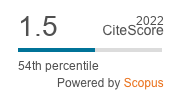Returns To Education During And After The Economic Crisis: Evidence From Latvia 2006–2012
DOI:
https://doi.org/10.1515/cer-2017-0008Keywords:
returns to education, Mincer coefficient, wage differentials model, higher education wage premium, instrumental variablesAbstract
We employ EU-SILC micro data for Latvia to study how returns to education changed during the economic crisis of 2008–2009 and afterwards. We found that returns to education increased significantly during the crisis and decreased slightly during the subsequent economic recovery. The counter-cyclical effect was evident in nearly all population groups. After the crisis, education became more associated than before with a longer working week and a higher employment probability. Furthermore, we show that returns to education in Latvia are generally higher in the capital city and its suburbs than outside the capital city region, as well as for citizens of Latvia than for resident non-citizens and citizens of other countries, but lower for males and young people. Wage differential models reveal a relatively large wage premium for higher education and a rather small one for secondary education. Estimates obtained with instrumental variable (IV) models significantly exceed the OLS estimates.
Downloads
References
Ashenfelter O. & Zimmerman D.J. (1997), Estimates of the Returns to Schooling from Sibling Data: Fathers, Sons, and Brothers, “Review of Economics and Statistics”, no. 79(1).
Google Scholar
Badescu, M., D’Hombres B., & Villalba E. (2011), Returns to education in European countries, Ispra Italy, European Commission – JRC.
Google Scholar
Blundell R., Dearden L. & Sianesi B. (2005), Evaluating the effect of education on earnings: models, methods and results from the National Child Development Survey, “Journal of the Royal Statistical Society: Series A (Statistics in Society)”, no. 168(3).
Google Scholar
Card D. (2001), Estimating the Return to Schooling: Progress on Some Persistent Econometric Problems, “Econometrica”, no. 69(5).
Google Scholar
Card D. (1999), The causal effect of education on earnings. “Handbook of Labor Economics”, no. 3(A).
Google Scholar
Fadejeva L.& Krasnopjorovs O. (2015), Labour Market Adjustment During 2008–2013 in Latvia: Firm Level Evidence. Latvijas Banka Working Paper, no. 2/2015.
Google Scholar
Flabbi L., Paternostro S. & Tiongson E.R. (2008), Returns to education in the economic transition: A systematic assessment using comparable data, “Economics of Education Review”, no. 27 (6).
Google Scholar
Hanushek E. A., Schwerdt G., Wiederhold S. & Woessmann L. (2015), Returns to skills around the world: Evidence from PIAAC, “European Economic Review”, no. 73.
Google Scholar
Harmon C., Oosterbeek H. & Walker I. (2000), The Returns to Education A Review of Evidence, Issues and Deficiencies in the Literature. London School of Economics and Political Science.
Google Scholar
Hazans M. (2003), Returns to Education in Baltic Countries. GDNet Knowledge Base Working Paper no. DOC16801.
Google Scholar
Leigh A. & Ryan C. (2008), Estimating returns to education using different natural experiment techniques, “Economics of Education Review”, no. 27(2).
Google Scholar
Mincer J. (1974), Schooling, Experience and Earnings. New York, NY: Columbia University Press.
Google Scholar
Ministry of Welfare (of the Republic of Latvia), 2006. Wages and the Factors That Impact Wages.
Google Scholar
Montenegro C.& Patrinos H.A. (2014), Comparable Estimates of Returns to Schooling around the World. The World Bank, Policy Research Working Paper Series, no. 7020.
Google Scholar
Psacharopoulos G. & Patrinos H.A. (2004), Returns to investment in education: a further update, “Education Economics”, no. 12(2).
Google Scholar
Romele L.(2014), Private and Social Returns to Education in Latvia. PhD dissertation, University of Latvia, Riga, Latvia.
Google Scholar
Strauss H. & De La Maisonneuve C. (2010), The Wage Premium on Tertiary Education: New Estimates for 21 OECD Countries, “OECD Journal: Economic Studies”, no. 2009(1).
Google Scholar
Trostel P., Walker I. & Woolley P. (2002), Estimates of the economic return to schooling for 28 countries, “Labour Economics”, no. 9(1).
Google Scholar
Downloads
Published
How to Cite
Issue
Section
License

This work is licensed under a Creative Commons Attribution-NonCommercial-NoDerivatives 4.0 International License.











